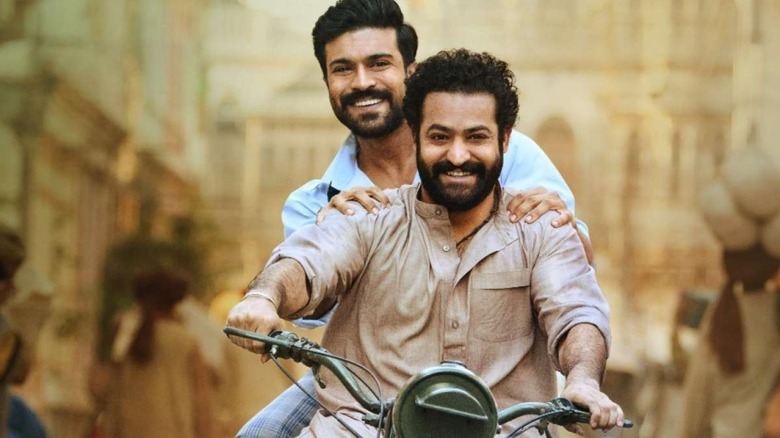RRR Director S.S. Rajamouli Was Inspired By Quentin Tarantino's Inglourious Basterds
Movies based on real history seldom end well, because it is not only hard to capture reality, but to make it cinematic. Taking liberties, especially in biographical movies, often leads to countless angry tweets and people being mad over what was included and what was changed. Movies based on historical events are frequently bound to disappoint simply because they can't surprise you, as the ending is already known. So the only question they can answer is how faithful it will be to real history.
This is one of the many, many, insurmountable reasons why "RRR" rules so much. Not only is this a perfect action movie, a perfect bromance movie, a perfect comedy, and a perfect musical, it is a perfect revisionist historical film that delivers a much better version of events than the real world. Whether you know of Indian history or not, it becomes rather obvious as the film goes along that S.S. Rajamouli isn't interested in a downer film about the British Empire brutally annihilating any shot at rebellion, or making a "Passion of the Christ" like torture porn about two revolutionaries.
Instead, this is a four-quadrant crowd-pleasing blockbuster that freely bends the truth. And according to Rajamouli, that is in part thanks to Quentin Tarantino's "Inglourious Basterds."
Who cares about real history when you have Bheem and Ram?
While it's true that historical movies aren't usually surprising, that all changed with Quentin Tarantino's "Inglourious Basterds" and the scene where Hitler is killed in a movie theater. Sure, that may not have been the first revisionist historical film, as many films had already shown historical events changed, from "Butch Cassidy and the Sundance Kid" to "Forrest Gump," but Tarantino's big, mainstream movie is more recent and therefore fresher in the mind, and it completely rewrites the history of its fictional world, for the better. It makes sense, then, that Tarantino would come back to revisionist historical fiction, again and again, turning historical fiction into pulp and giving us a better take on our history.
Though in the decade since, "Inglourious Basterds" hasn't sparked a full trend of revisionist historical films, there have been some, from "Spencer" to "Blonde." But "RRR" is perhaps the most effective, and the closest a movie has got to replicate the sheer sense of victory and surprise of Tarantino's WWII film, or the ending of "Once Upon a Time in Hollywood."
In an interview on the December issue of Empire magazine, S. S. Rajamouli spoke of how Tarantino's sixth film inspired him to disregard accuracy in order to seek maximum entertainment. "That guy broke a rule which no-one dared to break before," the director said. "It was a big, big eye-opener for me."
Indeed, from the comic-book-like imagery of Bheem throwing a tiger at British officers, or the power of friendship allowing him and Ram to combine like a flesh Voltron to escape a prison, "RRR" follows the rule of cool at every turn. It makes perfect sense, then, that Rajamouli would take a page out of Tarantino's book and have his heroes singlehandedly beat the British Empire out of Delhi.

